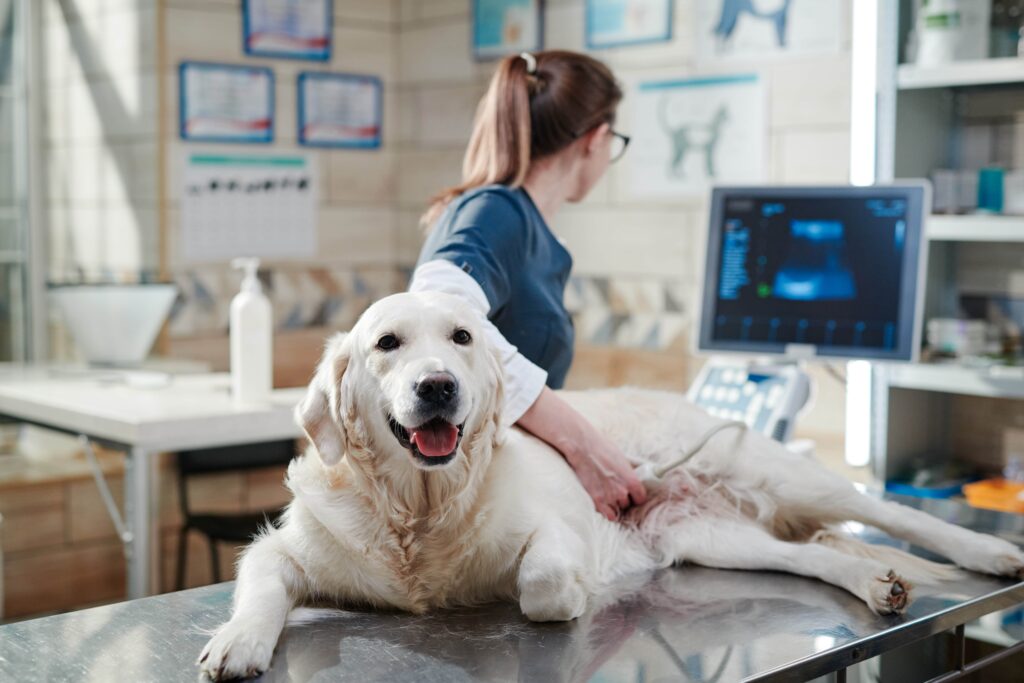
Contents
- 1 What is Congestive Heart Failure in Dogs?
- 2 What Are the Common Symptoms of Congestive Heart Failure in Dogs?
- 3 How Is Congestive Heart Failure Diagnosed in Dogs?
- 4 How to Treat Congestive Heart Failure in Dogs?
- 5 How to Comfort a Dog with Congestive Heart Failure
- 6 How to Support Your Dog at Home with Congestive Heart Failure
- 7 Can Dogs with Congestive Heart Failure Live Long Lives?
- 8 FAQ Section
- 9 Conclusion
If your dog has started coughing, breathing heavily, or tiring out quickly, it may be more than just aging—it could be congestive heart failure (CHF). This condition happens when the heart can’t pump blood effectively, leading to fluid buildup in the lungs and body. While congestive heart failure in dogs sounds alarming, the right care and treatment can greatly improve your dog’s comfort and quality of life.
In this guide, we’ll explain the early symptoms to watch for, the best treatment for congestive heart failure in dogs, and simple ways to care for your pet
What is Congestive Heart Failure in Dogs?
Congestive heart failure (CHF) in dogs occurs when the heart can no longer pump blood efficiently, leading to fluid buildup in the lungs, abdomen, or limbs. It often results from chronic heart disease, high blood pressure, or heartworm disease. Without proper management, CHF can worsen and affect the quality of life.
What Are the Common Symptoms of Congestive Heart Failure in Dogs?
Recognizing the signs of CHF early can make a big difference in your dog’s treatment and comfort. Common symptoms of congestive heart failure in dogs include:
- Coughing
Coughing, especially during or after exercise, is one of the most noticeable signs of CHF. This occurs because fluid buildup in the lungs causes irritation, leading to coughing as your dog’s body attempts to clear the airways. If the coughing becomes persistent or worsens, it’s a key sign that your dog’s heart may not be functioning as it should. - Labored Breathing
Dogs with CHF often have difficulty catching their breath, even when they’re resting. You may notice your dog breathing heavily or rapidly, or they might seem to struggle to get enough air. This is due to the fluid accumulation in the lungs that hampers proper lung function and oxygen flow. - Fatigue and Lethargy
A lack of energy and disinterest in usual activities are common in dogs with CHF. Since the heart is unable to pump blood effectively, less oxygen reaches the muscles and tissues, leading to exhaustion. You may see your dog resting more often or avoiding playtime and walks. - Distended Abdomen
A swollen or distended abdomen in a dog with CHF is a sign that fluid has accumulated in the abdomen, a condition known as ascites. This can cause your dog to appear bloated or uncomfortable. If your dog’s abdomen looks unusually large or feels hard to the touch, it’s important to consult your vet immediately. - Fainting or Collapse
When a dog experiences CHF, reduced blood flow to the brain can lead to fainting or collapse. This may occur suddenly and without warning, often after physical exertion. If your dog faints or seems disoriented, it’s a sign that their heart is struggling to pump blood effectively, and urgent veterinary attention is required.
If your dog shows these symptoms, it’s important to seek veterinary care immediately for a proper diagnosis and treatment plan.
How Is Congestive Heart Failure Diagnosed in Dogs?
Diagnosing CHF typically involves a combination of a physical exam, history, and diagnostic tests. Your vet may perform:
- X-rays or ultrasounds: To check for fluid in the lungs and assess the heart’s size and function.
- Blood tests: To check for signs of heart disease and organ function.
- ECG: An electrocardiogram can monitor heart rhythms and detect irregularities.
A prompt diagnosis helps your vet determine the best course of action to manage CHF and improve your dog’s quality of life.
How to Treat Congestive Heart Failure in Dogs?
Treatment for CHF in dogs aims to manage symptoms, improve heart function, and reduce fluid buildup. Here are some common treatments:
- Medications: Diuretics help remove excess fluid, ACE inhibitors reduce blood pressure, and beta-blockers improve heart function.
- Oxygen therapy: Helps increase oxygen supply and ease breathing.
- Surgical intervention: In some severe cases, surgery may be needed to correct underlying heart issues.
- Specialized diets: Low-sodium diets are often recommended to prevent fluid retention and manage heart health.
While CHF can’t be cured, these treatments can significantly improve your dog’s comfort and longevity. Always consult with your vet.
How to Comfort a Dog with Congestive Heart Failure
Living with CHF can be difficult for your dog, but there are ways you can comfort them:
- Limit Exercise:
Strenuous physical activity can put excessive strain on your dog’s heart. It’s important to avoid any activities that could cause overexertion. Opt for short, gentle walks and limit playtime to prevent further stress on the heart. - Keep Them Cool:
Heat and humidity can worsen CHF symptoms, as they increase the strain on the heart. Ensure your dog stays cool by providing plenty of water and offering a cool, shaded place to rest. You can also use fans or air conditioning if needed. - Provide a Cozy Resting Place:
Allow your dog to rest in a quiet, comfortable space where they feel safe and at ease. A cozy bed in a calm environment will help them relax, and you can monitor their breathing and comfort while they rest. - Monitor Symptoms:
Keep a close eye on your dog’s symptoms, such as their breathing, appetite, and energy levels. Tracking changes or worsening symptoms can help you alert your vet if any adjustments need to be made to their treatment plan.
By following these tips and staying in close contact with your vet, you can help your dog manage their condition.
How to Support Your Dog at Home with Congestive Heart Failure
Supporting your dog at home is essential to managing CHF and improving their quality of life. Some steps include:
- Follow your vet’s treatment plan: Ensure they take their medications as prescribed and attend all check-ups.
- Monitor their weight: Keep your dog at a healthy weight to reduce strain on the heart.
- Create a calm environment: Stress can worsen symptoms, so ensure your dog’s environment is peaceful and calm.
Can Dogs with Congestive Heart Failure Live Long Lives?
Yes, many dogs with congestive heart failure can live long, happy lives with the right care. Early diagnosis, proper medication, and lifestyle adjustments like a low-sodium diet and limited exercise can help manage symptoms. Regular monitoring is essential to adjust treatments as needed.
FAQ Section
How can I manage my dog’s congestive heart failure at home?
Managing CHF at home includes providing the prescribed medications, controlling exercise, and feeding a heart-healthy diet. Regular monitoring of your dog’s weight and symptoms will help keep the condition stable.
What is the first sign of congestive heart failure in dogs?
The first sign of CHF often includes coughing, especially after exercise or at night. Other early symptoms include difficulty breathing, lethargy, and a reduced appetite. Seek veterinary care for a full evaluation.
Can my dog’s congestive heart failure worsen over time?
Yes, CHF is a progressive condition. While treatment can help manage symptoms, the disease can worsen over time. Regular vet visits and adherence to treatment plans are essential to managing the condition effectively.
Is congestive heart failure curable in dogs?
While congestive heart failure cannot be cured, it can be managed with medications, lifestyle changes, and regular veterinary care. This can significantly improve your dog’s quality of life and extend their lifespan.
How long can a dog live with congestive heart failure?
With proper care, many dogs with congestive heart failure live for several months to years. The longevity depends on the severity of the condition and how well it’s managed with medications, diet, and exercise restrictions.
Conclusion
Congestive heart failure in dogs can be a challenging condition to manage, but with the right treatment and lifestyle adjustments, your dog can live a comfortable and fulfilling life. By recognizing the symptoms early and following a proper care plan, you can help your dog stay healthy and happy for years to come.
At North MS Pet Emergency, we are here to provide expert care for dogs with congestive heart failure and other heart-related conditions. From timely assessments to personalized treatment plans, we’re here when your dog needs us most.
Contact us today or visit us for after-hours care. We are here to provide support and care for your pet when they need it most.




